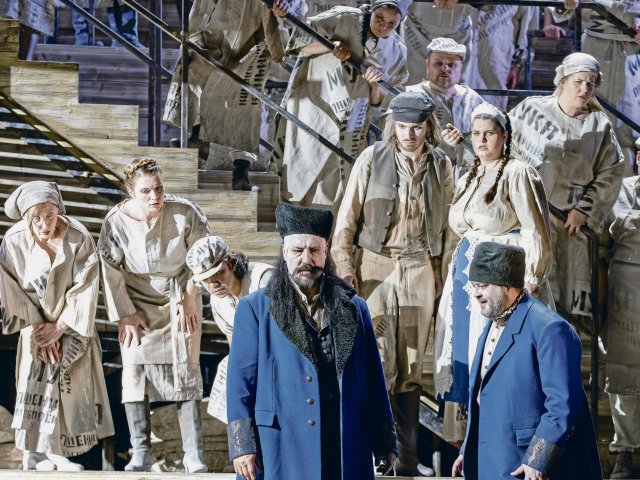Sex and violence, an everyday problem, brought to the stage
Photo: Tom Schulze
Russian province, around the middle of the 19th century: Katerina Ismailowa is a merchant’s wife and childless. Her husband is obviously to blame for this, a wimp in every sense of the word. That doesn’t stop the rich father-in-law, the family tyrant, from insulting Katerina when he doesn’t want to sneak into her bed himself. And the boredom! Katerina is not allowed to do anything. Others do the work. And the group of Ismailov’s servants are as submissive as they are greedy for violence, always ready to attack weaker people.
In his second opera, which premiered in 1934, Dmitri Shostakovich painted a dark picture of tsarist Russia, with peculiarities that had by no means been overcome 17 years after the October Revolution. The work also shows the story of an attempt to break out that fails. Katerina falls in love with the worker Sergei, who takes advantage of the opportunity. The father-in-law catches the couple, whips Sergei and falls victim to Katerina’s cooking skills (mushrooms with rat poison) that same evening. The husband he had previously summoned is beaten to death and is officially considered absent, which enables Katerina and Sergei to get married. The party is suddenly disrupted by the police because a drunkard discovered the body while looking for something to drink. The final act shows the couple along with many other convicts on their way to exile in Siberia.
The music alternates between pathos and parody with harsh cuts. A funny song by the Pope, who doesn’t want to know anything about the patriarch’s hints about his poisoning, stands next to a powerfully escalating passacaglia; Hints of operetta-like, grotesque marches and extensive use of drums, especially in the numerous violent scenes, do the rest. “Chaos instead of music” was the title of a scathing article in Pravda two years after the premiere. Ostensibly it was about the opera, but the attack belongs in the context of the fight against “left” art, i.e. the Russian-Soviet avant-garde. By the mid-1930s, the war was already predictable, and the Soviet leadership was committed to a culture that was capable of appealing to and mobilizing the entire population.
Director Francisco Negrin darkens the already dark work in Leipzig. The stage (Rifail Ajdarpasic) is initially dominated by a huge scaffolding, which represents a factory-like mill and is demolished in the course of the action, as is a large Fabergé egg in the center, which refers to the splendor of the powerful in the tsarist era. Ismailov’s workers move around on the scaffolding and look curiously and sometimes maliciously at the goings-on of the merchant family at Negrin. Strangely enough, the characterization in such passages is better than where Shostakovich actually brings the brutally acting people onto the stage. The opera is unmistakably about sex and violence, but both are difficult to portray on the opera stage. Negrin wants to avoid mere naturalism, but stops halfway on the path to the symbolic.
This also applies to the opera’s most infamous scene, Sergei’s first visit to Katerina’s bedroom, which leads to a musically drastic copulation with elements of rape. Sergej from Leipzig has a convincing vocal cast with Brenden Gunnell, but that’s the only attractive thing about him here. On stage he has to suggest a variety of positions with Katerina that lack any eroticism.
An opulent work that requires the world it depicts to be eliminated in favor of a better one.
Photo: Tom Schulze
It is clear that the opera’s Sergei is a liar and a scoundrel and that he just wants to take advantage of Katerina from the start. But should he have a few seemingly likeable traits or at least sexual power: only where there was hope can it be disappointed. This is also a dramaturgical problem. The directing team, the program notes reveal, sees the opera as a nihilistic piece. But the work also contains the opposite position: that the world it shows must be eliminated in favor of a better one.
Regardless of the concept, Leipzig always produces impressive images and convincing scenic arrangements. By far the best is the Siberian final act, which actually has nothing positive left and has largely become symbolic. Above all, the production can rely on Ingela Brimberg, who conveyed the entire range of emotions in the title role with an extraordinarily versatile voice and was rightly applauded. Fabrizio Ventura conducted the Gewandhaus Orchestra and brought out the satirical elements in the score as well as the aggressive massing of sounds, which nevertheless always remained audible.
Next May 29th, June 2nd and 5th
Become a member of the nd.Genossenschaft!

Since January 1, 2022, the »nd« will be published as an independent left-wing newspaper owned by the staff and readers. Be there and support media diversity and visible left-wing positions as a cooperative member. Fill out the membership form now.
More information on www.dasnd.de/genossenschaft
